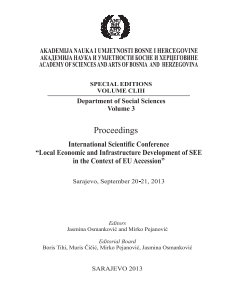CIVIL SOCIETY: AN INEVITABLE PARTNER IN THE DEVELOPMENT OF LOCAL COMMUNITIES IN YOUNG DEMOCRACIES
CIVIL SOCIETY: AN INEVITABLE PARTNER IN THE DEVELOPMENT OF LOCAL COMMUNITIES IN YOUNG DEMOCRACIES
Author(s): Josip Kregar, Antonija Petričušić
Subject(s): Civil Society, Governance, Social development, Economic development
Published by: Akademija Nauka i Umjetnosti Bosne i Hercegovine
Keywords: Democratic consolidation; Consolidation of civic culture and civil society; Civil society; Trust;
Summary/Abstract: The classical democratization theories often ignore the importance of civil society in successful democratic consolidation emphasizing predominantly the importance of institutional consolidation and legislative reforms. However, institutions and legal norms are often empty shells in democratic consolidation if not promoted among political forces (representative and behavioural consolidation) and through consolidation of civil society and civic culture (attitudinal consolidation). In this article we argue that the process of democratic consolidation has many dimensions and is result of specific ideographic circumstances. The cultural (political culture) and institutional dimension (institutional building) of democratic consolidation do not correspond and have different pace and scope of changes. That is because the cultural change is slow, reinforced by mentalities which are often not supportive towards new institutional principles and blueprints, legislative changes and official politics. In such discrepancy, the phenomenon is seen as unpredictable, as a gap between programs and realities, strategies and realization. The change is perceived as formal and successes are reversible. In the emerging democracies such a gap is bridged by the activity of the civil society. Though the civil society is promoting democratic values and policies it cannot replace the main institutional skeleton of state (bureaucracy, political parties, etc.). It furthermore depends significantly on global programs and international support which subsequently might result in a strong bias toward isolation from society and the local priorities. The situation is paradoxical: the state and political elites are not ready to promote (democratic) changes and civil society organizations are marginalized to politically neutral subjects. In explaining conditions pertinent to a successful democratic consolidation, this article assesses if civil society has the capacity to promote changes of predominant social values in young democracies and induce an emergence of civic culture.
- Page Range: 45-57
- Page Count: 13
- Publication Year: 2013
- Language: English
- Content File-PDF

